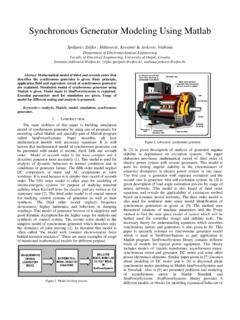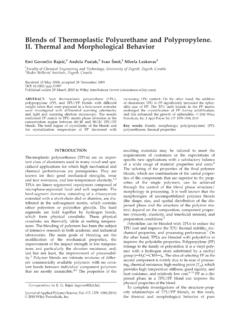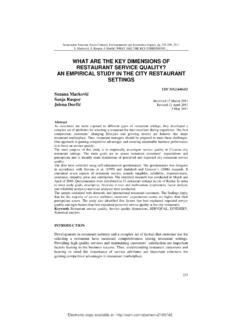Transcription of IMPORTANCE OF DISTRIBUTION CHANNELS - MARKETING …
1 785 Professor Zdenko Segetlija, PhD University of , Faculty of Economics in Osijek 31 000 Osijek, Gajev trg 7, Croatia Tel. 00385 31 224 400; Fax: 00385 31 211 604 E-mail: Professor Josip Mesari , PhD University of , Faculty of Economics in Osijek 31 000 Osijek, Gajev trg 7, Croatia Tel. 00385 31 224 400; Fax: 00385 31 211 604 E-mail: Davor Dujak, MSc University of , Faculty of Economics in Osijek 31 000 Osijek, Gajev trg 7, Croatia Tel. 00385 31 224 400; Fax: 00385 31 211 604 E mail: IMPORTANCE OF DISTRIBUTION CHANNELS - MARKETING CHANNELS - FOR NATIONAL ECONOMY ABSTRACT The paper starts from the IMPORTANCE of merchandise DISTRIBUTION and DISTRIBUTION CHANNELS and mutual relationships of the participants in them. Development of DISTRIBUTION CHANNELS based on the concentration processes and integration of functions is emphasized. In this context, the position of retail in DISTRIBUTION system is defined in terms of its business units and new elements in their design related to the application of certain business models.
2 The authors try to give hints for finding ways to create new forms of DISTRIBUTION CHANNELS and retail business units in the respective national economies. The foundations for such considerations are the theoretical assumptions about the development of new forms of retail business units, as well as contemporary problems in the functioning of retail systems in individual countries. The basis for this development lies in new technological possibilities, opportunities offered by modern information technologies and new understanding of the connection between physical commodity 786 processes. In this sense, modern vertical MARKETING systems, new business models and multi-channel retailing can be observed. Key words: DISTRIBUTION CHANNELS , value chain, vertical MARKETING systems, business models, multi-channel retailing 1. INTRODUCTION The starting point of this paper is the term DISTRIBUTION and its meaning.
3 DISTRIBUTION CHANNELS are defined and classified. Their development is explained and new possibilities of their development in contemporary conditions are indicated. In this sense, a variety of DISTRIBUTION CHANNELS exists, as well as the contemporary understanding of managing supply chains and value creation networks. The IMPORTANCE of DISTRIBUTION CHANNELS is analysed both for individual economic operators, groups and for the aggregate national economy. These types of analyses start with the share of big firms and groups, both on national and international levels. This is the case of relationships between different economic operators within value creation chains. This is why earlier concepts of the role and IMPORTANCE of commerce in national economy are losing their IMPORTANCE . The purpose of this paper is to point out various controversial concepts of economic structure and the possibilities of economic systems of certain countries.
4 Moreover, the authors have tried to indicate certain solutions in creating new forms of DISTRIBUTION CHANNELS and retail business units in certain national economies. 2. DISTRIBUTION AND ITS CHANNELS In its broadest sense, when it refers to the whole economic system , DISTRIBUTION is the allocation of income and assets within one society. In business economics, distributions relates to the allocation of goods to the recipients. In general, DISTRIBUTION includes all activities that enable the transfer of material and/or economic power over tangible and/or intangible goods from one economic subject to another ( , 2011). 787 This paper is concerned with the DISTRIBUTION in business economics, as well as its implications on the whole economic system , on the whole national economy, since DISTRIBUTION is one of the main functions of retail trade ( , 2011).
5 Domschke and Schield thus emphasise: DISTRIBUTION encompasses a system of all activities that are related to the transfer of economic goods between manufacturers and consumers. It includes such a coordinated preparation of manufactured goods according to their type and volume, space and time, so that supply deadlines can be met (order fulfilment) or estimated demand can be efficiently satisfied (when producing for an anonymous market) (Domschke & Schield, 1994). DISTRIBUTION systems are usually divided into: (a) acquisition DISTRIBUTION system (b) logistic, physical DISTRIBUTION system . G. Specht has pointed out that this division is not completely accurate, since both of these subsystems exhibit certain common starting points. According to this author, acquisition DISTRIBUTION system management includes the management of DISTRIBUTION routes, DISTRIBUTION CHANNELS .
6 Logistic DISTRIBUTION system is focused on bridging the space and time by transportation and storage, as well as order processing and shipment, supply logistics, the movement of materials (compare Specht, 1988, 34-35). The term DISTRIBUTION CHANNELS can at the moment be replaced by the term MARKETING channel . MARKETING channel as a more complex term has been used in the USA since the 1970s, because the intermediaries include not only those who participate in the physical flow of a product from the manufacturer to the end user, but also those that have a role in the transfer of product ownership, as well as other intermediary institutions that participate in the value DISTRIBUTION from production to consumption (Tipuri , 1993, 15-16). Therefore, it is assumed that there are three types of MARKETING CHANNELS (Kotler & Keller, 2008, 26): communication CHANNELS , DISTRIBUTION CHANNELS and service CHANNELS .
7 788 DISTRIBUTION or MARKETING CHANNELS are systems of mutually dependent organisations included in the process of making goods or services available for use or consumption. 1 Moreover, a MARKETING channel is "the external contactual organization that management operates to achieve its DISTRIBUTION objectives 2 (Rosenbloom, 2004, 8). There follow some more recent concepts of the DISTRIBUTION channel: Channel of DISTRIBUTION The route along which goods and services travel from producer/manufacturer through MARKETING intermediaries (such as wholesalers, distributors, and retailers) to the final user. CHANNELS of DISTRIBUTION provide downstream value by bringing finished products to end users. This flow may involve the physical movement of the product or simply the transfer of title to it. Also known as a DISTRIBUTION channel, a DISTRIBUTION chain, a DISTRIBUTION pipeline, a supply chain, a MARKETING channel, a market channel, and a trade channel.
8 (Ostrow, 2009, 59). Similarly, DISTRIBUTION channel is defined by Hill: " DISTRIBUTION channel - one or more companies or individuals who participate in the flow of goods and services from the manufacturer to the final user or consumer" (Hill, 2010, 93). Nevertheless, other types of flows should not be neglected in DISTRIBUTION CHANNELS , so that the following definition is also possible: "Channel of DISTRIBUTION consist of one or more companies or individuals who participate in the flow of goods, services, information, and finances from the producer to the final user or consumer. (Coyle, Bardi, & Langley, 2003, 106) These are various routes that products or services use after their production until they are purchased and used by end Therefore, MARKETING CHANNELS , DISTRIBUTION CHANNELS are all those organisations that a product has to go through between its production and consumption (Kotler/Wong/Saunders/Armstrong, 2006, 858).
9 1 Stern, L. W.; El -Ansary, A. I.: MARKETING CHANNELS , 5th Ed., Prentice-Hall, 1996., according to: Kotler, 2001., p. 230. 2 The author states that the term "contactual organization" refers to those companies or parties involved in negotiation functions as the product or service moves from the manufacturer to its end-users. Negotiating functions consist of the purchase, sale and transfer of ownership of products or services. 3 Coughan, Anne. T.; Andersen, E.; Stern, L. W.; El-Ansary, A. I.: MARKETING CHANNELS , 6 th Ed., Prentice-Hall, 2001., according to: Kotler/Keller, 2008., p. 468. 789 In the so-called consumer MARKETING CHANNELS , the MARKETING channel system usually includes the following operators: producer/manufacturer, wholesaler, intermediary, and retailer. On the other hand, when it comes to business MARKETING CHANNELS , the following are included: producer/manufacturer, representative or sales subsidiary of manufacturer, business distributor and business client (Kotler/Wong/Saunders/Armstrong, 2006, p.)
10 861). Different authors describe the possible options of MARKETING , DISTRIBUTION CHANNELS in different ways. Nevertheless, the basic division is into direct and indirect CHANNELS . In direct CHANNELS , producers/manufacturers sell their goods directly to individual consumers, while indirect CHANNELS include a trading company as well. An indirect MARKETING channel can be both short and long. Only one trading company is included in the short channel (usually, it is a retail company). In the long channel, there are two or more intermediaries (wholesale and retail companies). Figure 1 shows an example of CHANNELS of DISTRIBUTION for products of food manufacturing firms. Figure 1 Examples of CHANNELS of DISTRIBUTION for products of food processing industry Source: Coyle, J. C., Bardi, E. J., & Langley, C. J. (2003): The Management of Business Logistics : A Supply Chain Perspective, South-Western, Thomson Learning, p.










